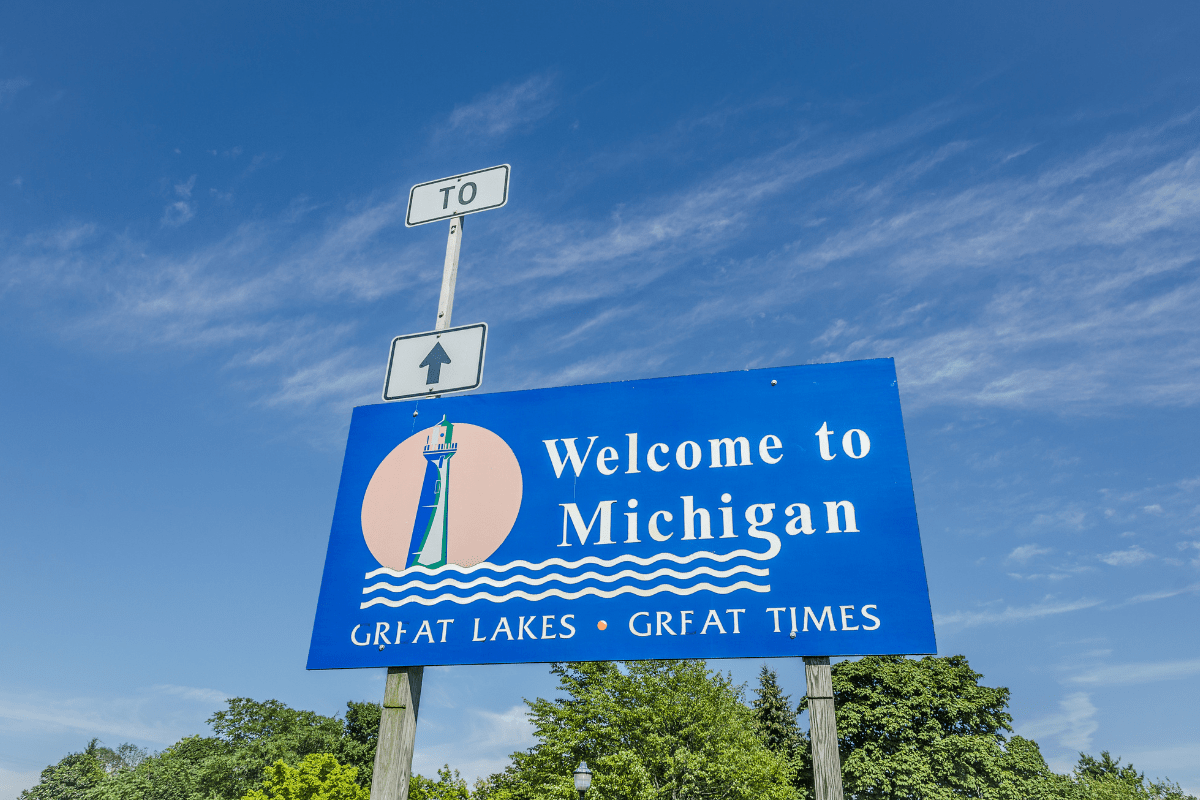Ever wonder if you're accidentally breaking the law just by living your normal life? In Michigan, you might be. From criminalizing unmarried couples who dare to share a mortgage to making it illegal to cut your friend's bangs, the Great Lakes State has accumulated centuries of weird laws that technically remain enforceable today.
The romance police are watching
Let's start with the juicy stuff. If you're a single man in Michigan, you might want to think twice before getting too charming. Under Michigan law MCL 750.532, seducing and debauching an unmarried woman is still a felony that could land you in prison for up to five years. Yes, you read that correctly… five years. The maximum fine? A cool $2,500, which seems almost quaint compared to the prison time.
The law requires prosecution within one year, which suggests our 1931 legislators expected swift justice for romantic impropriety. Speaking of which, adultery remains a felony too under MCL 750.30, though there's a catch: only the wronged spouse can press charges. This little provision has probably saved thousands of Michiganders from becoming felons over the decades.
But wait, there's more relationship weirdness to unpack.
Living in sin was literally illegal
Until July 2023, Michigan was one of only two states (alongside Mississippi) that still criminalized unmarried couples living together. The law made it illegal for any man and woman to "lewdly and lasciviously associate and cohabit together."
Senator Stephanie Chang discovered this 1931 relic caused problems for unmarried couples trying to claim dependents on federal taxes. The Michigan Senate finally voted 29-9 to repeal it in April 2023, and Governor Gretchen Whitmer signed it into law that summer. Progress moves slowly sometimes.
Everyday crimes you're probably committing
Now for the laws that might actually affect your daily life. Ever trim a friend's hair? Congratulations, you're a criminal in Michigan. MCL 339.1203a requires a cosmetology license to cut anyone's hair outside your immediate family, even if you're doing it for free.
The penalties aren't exactly a slap on the wrist either:
- First offense: $500 fine
- Repeat offenses: $1,000 fine
- Possible jail time: One year
- Your defense: "But I was helping!"
- The law: "Doesn't matter"
Planning to celebrate your promotion with drinks on the train ride home? Think again. A 1913 law still makes it a misdemeanor to board or remain on any railway train while intoxicated. The law specifically mentions "interurban cars," which haven't existed in Michigan for decades, but the statute soldiers on regardless.
And if you're thinking about buying a car this weekend, make sure it's not Sunday. Michigan's 1953 Blue Law prohibiting Sunday car sales remains actively enforced. Interestingly, counties with populations under 130,000 get a pass, presumably because rural dealers complained about losing business to competitors across county lines.
Watch your mouth (seriously)
Michigan takes profanity surprisingly seriously, or at least it used to. The state's most famous weird law case involved the "Cussing Canoeist," and it's a wild ride.
The case that changed everything
In August 1998, Timothy Boomer, a computer programmer from Roseville, fell out of his canoe on the Rifle River. Like any reasonable person who just took an unexpected swim, he let loose a string of profanities. Unfortunately for Boomer, a family with children was within earshot, and police charged him under an 1897 law against using indecent language in the presence of women or children.
A jury found Boomer guilty in June 1999. His punishment included a $75 fine and four days of community service at a daycare center, which seems like an odd choice given the nature of his crime. The ACLU of Michigan took up his case, arguing the law violated the First Amendment.
In March 2002, the Michigan Court of Appeals agreed, ruling the statute was unconstitutionally vague. The court noted that the law "could possibly subject a vast percentage of the populace to a misdemeanor conviction." Despite being declared unconstitutional, the law wasn't officially repealed until 2015.
But profanity laws weren't the only speech crimes on Michigan's books. MCL 750.102 still makes blasphemy a misdemeanor, while MCL 750.103 specifically outlaws profanely cursing using God, Jesus Christ, or the Holy Ghost's names. That last one requires prosecution within five days, suggesting even 1931 legislators knew these cases would be hard to pursue.
City-specific weirdness that defies explanation
While state laws provide plenty of entertainment, Michigan's cities have contributed their own special brand of bizarre ordinances. These local laws often tell fascinating stories about specific moments in each city's history.
Detroit's animal fashion requirements
In Detroit, any pig running free within city limits must wear a nose ring. This law likely dates from Detroit's transition from frontier town to industrial metropolis, when urban pigs were apparently enough of a problem to require legislative action. The Motor City also prohibits "willfully destroying old radios," probably a World War II measure to preserve materials for the war effort.
Harper Woods has trust issues
Harper Woods addresses a surprisingly specific form of fraud: painting sparrows to resemble parakeets for sale. The specificity suggests someone, somewhere, actually tried this scam, prompting lawmakers to close this particular loophole in consumer protection law.
Clawson gets really specific
Clawson takes things to another level entirely. The city explicitly prohibits farmers from sleeping with their farm animals, raising questions about what incident prompted such legislation. They also require three days' notice before hosting a duel, ensuring proper time for seconds to be chosen and surgeons to be summoned.
Other notable city ordinances include:
- Grand Haven: $5 fine for hoop skirts
- Rochester: Bathing suits need police inspection
- No dueling without proper notice
- Keep your painted birds honest
- Nose rings mandatory for pigs
- Radio destruction strictly forbidden
- Farm animals: look don't touch
- Three days notice for violence
Why these laws exist (and persist)
Understanding Michigan's weird laws requires a trip back to 1931, when the state consolidated its criminal statutes during the Great Depression through Act 328. This comprehensive legal overhaul reflected the moral concerns of early 20th-century America, enshrining Victorian-era values into law.
The timing wasn't coincidental. The 1920s and early 1930s saw massive social upheaval. Women had just won the right to vote, jazz music was corrupting the youth, and prohibition was creating more problems than it solved. Michigan's legislators responded by codifying traditional moral values into law, creating our modern collection of romantic felonies and speech crimes.
The prohibition connection
Michigan's relationship with alcohol adds another layer to the weird law story. The state went dry in 1918, two years before national prohibition. By 1927, Michigan had the nation's harshest enforcement: any liquor violation became a felony, and a fourth offense meant life in prison. Life. In. Prison. For drinking.
This zealous approach to temperance created lasting legal oddities. The train intoxication law emerged from legitimate safety concerns during the industrial age, but it remains enforceable over a century later, long after interurban cars disappeared from Michigan's landscape.
Bryan Waldman, an attorney with Sinas Dramis Law Firm who has extensively researched unusual state laws, puts it perfectly: "These laws serve as fascinating reminders of the state's legislative history. They're curious relics of a bygone era rather than active enforcement priorities."
The slow march toward sanity
Michigan has made some progress cleaning up its legal code, though the pace would make a glacier look speedy.
The 2015 cleanup
In December 2015, Governor Rick Snyder signed the "Archaic Laws Package," repealing 16 outdated statutes. The eliminated laws included:
- Six separate dueling laws
- Playing the national anthem badly
- Cursing in public
- Walkathon restrictions
- Trampling blackberry bushes
- Refusing to fight fires
Yes, Michigan had six different laws about dueling. Six. Someone really wanted to make sure people stopped shooting each other at dawn.
Why change takes forever
According to the Mackinac Center, Michigan has over 3,100 criminal laws spread across 918+ criminal code sections. That's 333 more sections than Illinois and eight times larger than the Model Penal Code. The Michigan Law Revision Commission continues working to identify outdated statutes, but with thousands of laws to review and limited legislative time, progress creeps along.
Legal experts agree these laws persist due to simple legislative inertia. The formal repeal process requires time, effort, and political will that could be spent on more pressing issues. Unless a law actively causes problems, like the cohabitation ban did with tax filings, it tends to remain on the books indefinitely.
How Michigan compares to its neighbors
Michigan's weird laws gain perspective when compared to neighboring states. While Michigan bans Sunday car sales, Ohio has no such restriction, giving Buckeye State dealers a competitive advantage near the border. Indiana joins Michigan in prohibiting Sunday car sales but adds its own peculiarities, like making it illegal to catch fish with bare hands.
Wisconsin might win the regional weird law competition. The Dairy State allegedly requires restaurants to serve cheese with apple pie upon request, though this is more tradition than law. Wisconsin definitely prohibits serving margarine instead of butter in restaurants unless customers specifically request it, protecting their massive dairy industry through legislation.
Living with legal oddities
So what does all this mean for average Michiganders? Probably not much. Most of these laws are what lawyers call "dead letter laws," technically valid but never enforced. No prosecutor is going to charge you for trimming your roommate's bangs or swearing when you stub your toe.
Some laws, however, remain actively enforced. The Sunday car sales ban affects actual business operations every week. The cosmetology license requirement occasionally catches unlicensed braiders or kitchen beauticians. And while nobody's been prosecuted for seduction lately, the law remains available for any prosecutor feeling particularly vindictive.
These laws serve as inadvertent time capsules, preserving the anxieties and values of past generations in amber. They emerged from real concerns: worker safety during industrialization, public order during rapid urbanization, and moral standards during social upheaval. The train intoxication law made sense when drunk passengers could fall between cars. Anti-dueling statutes addressed actual violence. Even the seduction law reflected genuine concerns about protecting women in an era before they could vote or own property.
Today, these statutes persist as monuments to bygone eras, simultaneously amusing and sobering reminders that today's common sense may become tomorrow's absurdity. They tell the story of a state that transformed from frontier territory to industrial powerhouse, absorbing waves of immigrants, adapting to new technologies, and struggling to balance moral traditions with personal freedom.
Until the next round of repeals, Michiganders must remain vigilant. You never know when that unauthorized haircut, Sunday car purchase, or particularly creative profanity might technically make you a criminal in the Great Lakes State. At least we can finally live together unmarried without fear of prosecution. Progress comes slowly, but it comes.





